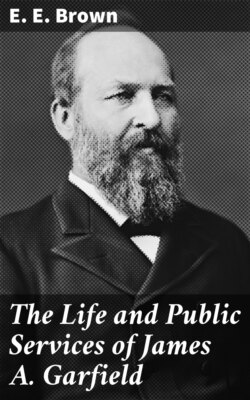Читать книгу The Life and Public Services of James A. Garfield - E. E. Brown - Страница 18
На сайте Литреса книга снята с продажи.
CHAPTER XIII.
ОглавлениеTable of Contents
Opening of Hostilities—Brave Charge of the Hiram Students—Giving the Rebels "Hail Columbia"—Sheldon's Reinforcement—The Rebel Commander Falls—His Army Retreats in Confusion.
With the first glimmer of light in the east, Garfield's men begin their march down into the valley. As the advance guard turns a jutting ridge, it is fired upon by a company of rebel horsemen. Instantly Garfield forms his soldiers into a hollow square, and a heavy volley from their rifles drives the enemy back.
Marshall and his whole army must be close by, but to find out their exact position, Garfield sends forward a reconnoitring party. Suddenly a twelve-pound shell whirs above the tree-tops, and tears up the ground at their feet. But the mounted company of twelve go bravely forward; and as they sweep around a curve in the road, another shell whistles past them, and they can hear in the distance a threatening rumble.
The enemy's position is at once clearly defined. The main body of their army is posted upon the top of two ridges at the left of Middle Creek, but there is also a strong detachment upon the right, with a battery of heavy artillery to hold the forks of the stream. Marshall's plan is to draw the Union forces down into the narrow rocky road along the Creek, where between two fires, he knows it will be an easy matter to hem them in and utterly destroy the whole number.
But Garfield, with his quick intuition, takes in the situation at a glance. He immediately orders a hundred of his Hiram students to cross the stream, climb the ridge where the firing has been most frequent, and open the battle.
Bravely the little company plunge into the icy stream, and clinging to the low underbrush, begin the perilous ascent. A shower of bullets from two thousand rifles is falling all around them, but nothing daunted, they press onward till the summit is reached. Then, from every side the deadly shots are hurled, and, for a moment, the little band begin to waver.
"Every man to a tree!" shouts the leader, Captain Williams. "Give them as good as they send, boys!"
The word passes from lip to lip, and instantly from behind the great oaks and maples, they take their stand, and open a volley of fire upon the rebels. This is followed by a hand-to-hand fight with the bayonets, and little by little, the brave boys are driven back.
"To the trees again!" cries the leader, "we may as well die here as in Ohio!"
One of the Hiram students, a lad of eighteen, is shot through the thigh, and a confederate soldier passing by says to him—
"Here, boy, give me your musket." "Not the gun, but its contents," he replies, and in another instant the rebel lies dead at his feet. His companion takes up a weapon to kill the brave young student, but the latter seizes the dead man's rifle and, with unerring aim, fells him to the ground.
When his comrades bear him away to the camp, and a surgeon tells him that the wounded limb must be amputated, his only words are: "Oh, what will mother do?"
The story of the noble lad—Charles Carlton of Franklin, Ohio—is told in the Ohio Senate, two weeks later, and a statute is immediately framed to make provision for the widows and mothers of our soldiers.
A hundred men like young Carlton present a steady resistance to the enemy's fire, but Garfield watching them from a rocky height, realizes their perilous situation and exclaims—
"They will surely be driven back, they will lose the hill unless supported."
Instantly, five hundred of the Ohio Fortieth and Forty-second, under Major Pardee and General Cranor, are ordered forward.
"Hurrah for Captain Williams and his Hiram boys!" they shout, as they ford the stream, holding their cartridge-boxes high above their heads. But the fire of four thousand muskets fall upon them and though—
